Essay on International Business: China's Market, Trade, and Ethics
VerifiedAdded on 2021/05/28
|5
|2076
|136
Essay
AI Summary
This essay provides a comprehensive analysis of international business in China, focusing on the opportunities and challenges for Small and Medium Enterprises (SMEs). It begins by examining the economic factors driving China's growth, such as GDP, labor costs, and technological advancements, while also addressing potential threats like inflation and trade politics. The essay then delves into social factors, including demographic changes and cultural nuances, highlighting their impact on business strategies. A significant portion of the essay is dedicated to trade theory and barriers, including tariffs, exchange rate controls, and licensing, and their implications for UK SMEs. Furthermore, it explores ethical and social issues like human rights, equal opportunities, and child labor, emphasizing the importance of Corporate Social Responsibility (CSR) in the Chinese market, including public image, volunteering, and environmental responsibility. The essay concludes by discussing cultural aspects, such as building trust and respecting Chinese business practices, and the importance of language in effective communication.
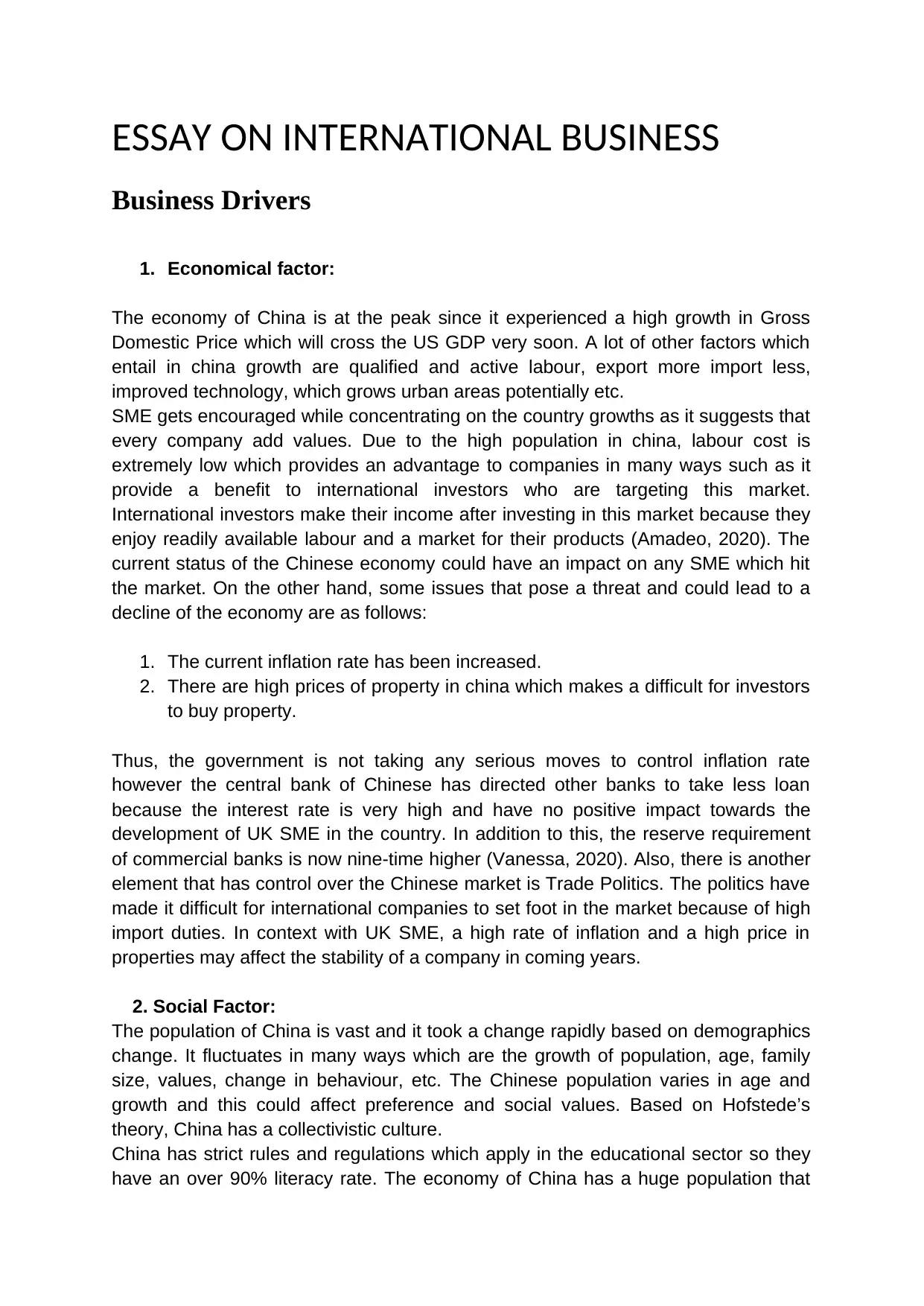
ESSAY ON INTERNATIONAL BUSINESS
Business Drivers
1. Economical factor:
The economy of China is at the peak since it experienced a high growth in Gross
Domestic Price which will cross the US GDP very soon. A lot of other factors which
entail in china growth are qualified and active labour, export more import less,
improved technology, which grows urban areas potentially etc.
SME gets encouraged while concentrating on the country growths as it suggests that
every company add values. Due to the high population in china, labour cost is
extremely low which provides an advantage to companies in many ways such as it
provide a benefit to international investors who are targeting this market.
International investors make their income after investing in this market because they
enjoy readily available labour and a market for their products (Amadeo, 2020). The
current status of the Chinese economy could have an impact on any SME which hit
the market. On the other hand, some issues that pose a threat and could lead to a
decline of the economy are as follows:
1. The current inflation rate has been increased.
2. There are high prices of property in china which makes a difficult for investors
to buy property.
Thus, the government is not taking any serious moves to control inflation rate
however the central bank of Chinese has directed other banks to take less loan
because the interest rate is very high and have no positive impact towards the
development of UK SME in the country. In addition to this, the reserve requirement
of commercial banks is now nine-time higher (Vanessa, 2020). Also, there is another
element that has control over the Chinese market is Trade Politics. The politics have
made it difficult for international companies to set foot in the market because of high
import duties. In context with UK SME, a high rate of inflation and a high price in
properties may affect the stability of a company in coming years.
2. Social Factor:
The population of China is vast and it took a change rapidly based on demographics
change. It fluctuates in many ways which are the growth of population, age, family
size, values, change in behaviour, etc. The Chinese population varies in age and
growth and this could affect preference and social values. Based on Hofstede’s
theory, China has a collectivistic culture.
China has strict rules and regulations which apply in the educational sector so they
have an over 90% literacy rate. The economy of China has a huge population that
Business Drivers
1. Economical factor:
The economy of China is at the peak since it experienced a high growth in Gross
Domestic Price which will cross the US GDP very soon. A lot of other factors which
entail in china growth are qualified and active labour, export more import less,
improved technology, which grows urban areas potentially etc.
SME gets encouraged while concentrating on the country growths as it suggests that
every company add values. Due to the high population in china, labour cost is
extremely low which provides an advantage to companies in many ways such as it
provide a benefit to international investors who are targeting this market.
International investors make their income after investing in this market because they
enjoy readily available labour and a market for their products (Amadeo, 2020). The
current status of the Chinese economy could have an impact on any SME which hit
the market. On the other hand, some issues that pose a threat and could lead to a
decline of the economy are as follows:
1. The current inflation rate has been increased.
2. There are high prices of property in china which makes a difficult for investors
to buy property.
Thus, the government is not taking any serious moves to control inflation rate
however the central bank of Chinese has directed other banks to take less loan
because the interest rate is very high and have no positive impact towards the
development of UK SME in the country. In addition to this, the reserve requirement
of commercial banks is now nine-time higher (Vanessa, 2020). Also, there is another
element that has control over the Chinese market is Trade Politics. The politics have
made it difficult for international companies to set foot in the market because of high
import duties. In context with UK SME, a high rate of inflation and a high price in
properties may affect the stability of a company in coming years.
2. Social Factor:
The population of China is vast and it took a change rapidly based on demographics
change. It fluctuates in many ways which are the growth of population, age, family
size, values, change in behaviour, etc. The Chinese population varies in age and
growth and this could affect preference and social values. Based on Hofstede’s
theory, China has a collectivistic culture.
China has strict rules and regulations which apply in the educational sector so they
have an over 90% literacy rate. The economy of China has a huge population that
Paraphrase This Document
Need a fresh take? Get an instant paraphrase of this document with our AI Paraphraser
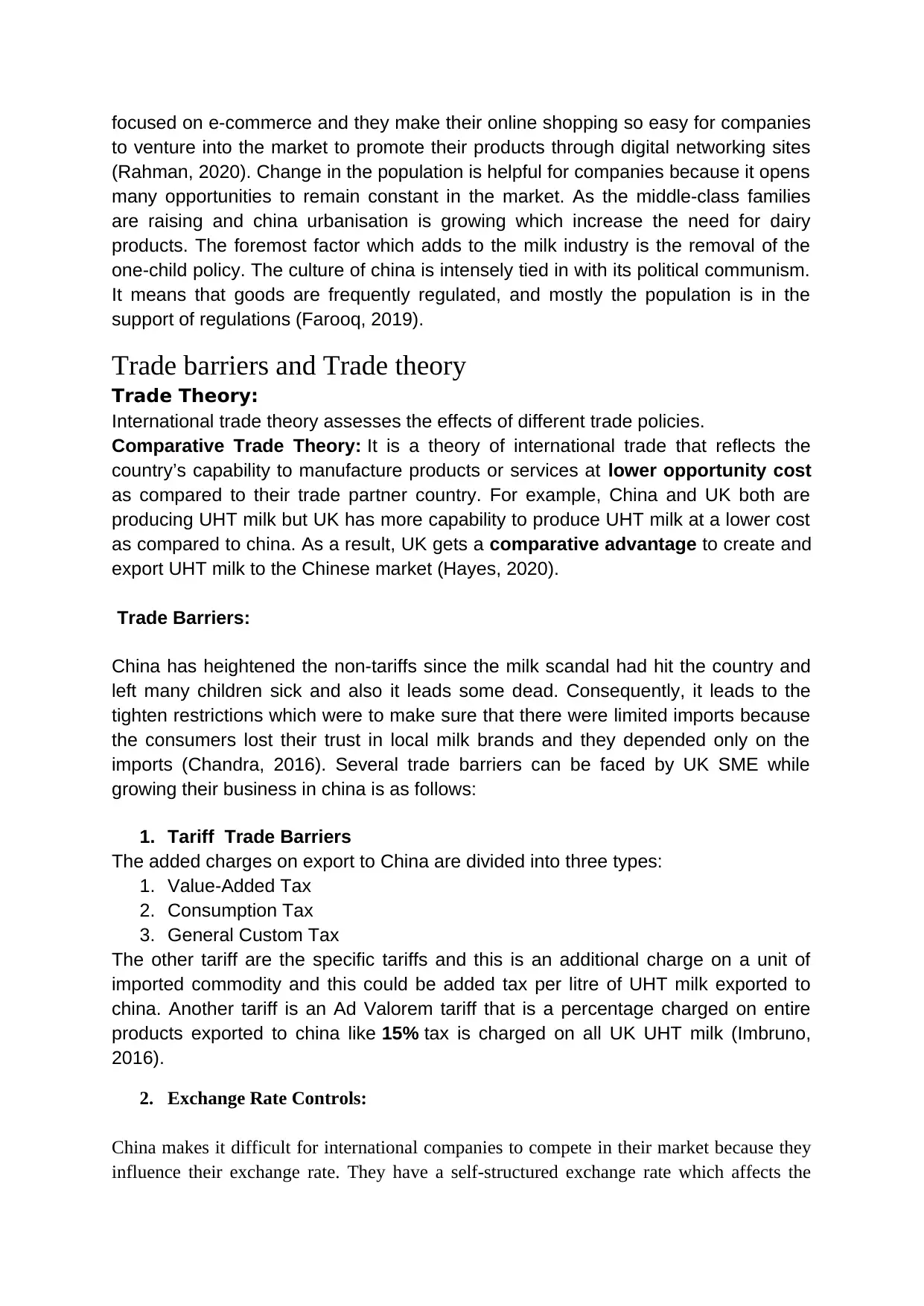
focused on e-commerce and they make their online shopping so easy for companies
to venture into the market to promote their products through digital networking sites
(Rahman, 2020). Change in the population is helpful for companies because it opens
many opportunities to remain constant in the market. As the middle-class families
are raising and china urbanisation is growing which increase the need for dairy
products. The foremost factor which adds to the milk industry is the removal of the
one-child policy. The culture of china is intensely tied in with its political communism.
It means that goods are frequently regulated, and mostly the population is in the
support of regulations (Farooq, 2019).
Trade barriers and Trade theory
Trade Theory:
International trade theory assesses the effects of different trade policies.
Comparative Trade Theory: It is a theory of international trade that reflects the
country’s capability to manufacture products or services at lower opportunity cost
as compared to their trade partner country. For example, China and UK both are
producing UHT milk but UK has more capability to produce UHT milk at a lower cost
as compared to china. As a result, UK gets a comparative advantage to create and
export UHT milk to the Chinese market (Hayes, 2020).
Trade Barriers:
China has heightened the non-tariffs since the milk scandal had hit the country and
left many children sick and also it leads some dead. Consequently, it leads to the
tighten restrictions which were to make sure that there were limited imports because
the consumers lost their trust in local milk brands and they depended only on the
imports (Chandra, 2016). Several trade barriers can be faced by UK SME while
growing their business in china is as follows:
1. Tariff Trade Barriers
The added charges on export to China are divided into three types:
1. Value-Added Tax
2. Consumption Tax
3. General Custom Tax
The other tariff are the specific tariffs and this is an additional charge on a unit of
imported commodity and this could be added tax per litre of UHT milk exported to
china. Another tariff is an Ad Valorem tariff that is a percentage charged on entire
products exported to china like 15% tax is charged on all UK UHT milk (Imbruno,
2016).
2. Exchange Rate Controls:
China makes it difficult for international companies to compete in their market because they
influence their exchange rate. They have a self-structured exchange rate which affects the
to venture into the market to promote their products through digital networking sites
(Rahman, 2020). Change in the population is helpful for companies because it opens
many opportunities to remain constant in the market. As the middle-class families
are raising and china urbanisation is growing which increase the need for dairy
products. The foremost factor which adds to the milk industry is the removal of the
one-child policy. The culture of china is intensely tied in with its political communism.
It means that goods are frequently regulated, and mostly the population is in the
support of regulations (Farooq, 2019).
Trade barriers and Trade theory
Trade Theory:
International trade theory assesses the effects of different trade policies.
Comparative Trade Theory: It is a theory of international trade that reflects the
country’s capability to manufacture products or services at lower opportunity cost
as compared to their trade partner country. For example, China and UK both are
producing UHT milk but UK has more capability to produce UHT milk at a lower cost
as compared to china. As a result, UK gets a comparative advantage to create and
export UHT milk to the Chinese market (Hayes, 2020).
Trade Barriers:
China has heightened the non-tariffs since the milk scandal had hit the country and
left many children sick and also it leads some dead. Consequently, it leads to the
tighten restrictions which were to make sure that there were limited imports because
the consumers lost their trust in local milk brands and they depended only on the
imports (Chandra, 2016). Several trade barriers can be faced by UK SME while
growing their business in china is as follows:
1. Tariff Trade Barriers
The added charges on export to China are divided into three types:
1. Value-Added Tax
2. Consumption Tax
3. General Custom Tax
The other tariff are the specific tariffs and this is an additional charge on a unit of
imported commodity and this could be added tax per litre of UHT milk exported to
china. Another tariff is an Ad Valorem tariff that is a percentage charged on entire
products exported to china like 15% tax is charged on all UK UHT milk (Imbruno,
2016).
2. Exchange Rate Controls:
China makes it difficult for international companies to compete in their market because they
influence their exchange rate. They have a self-structured exchange rate which affects the
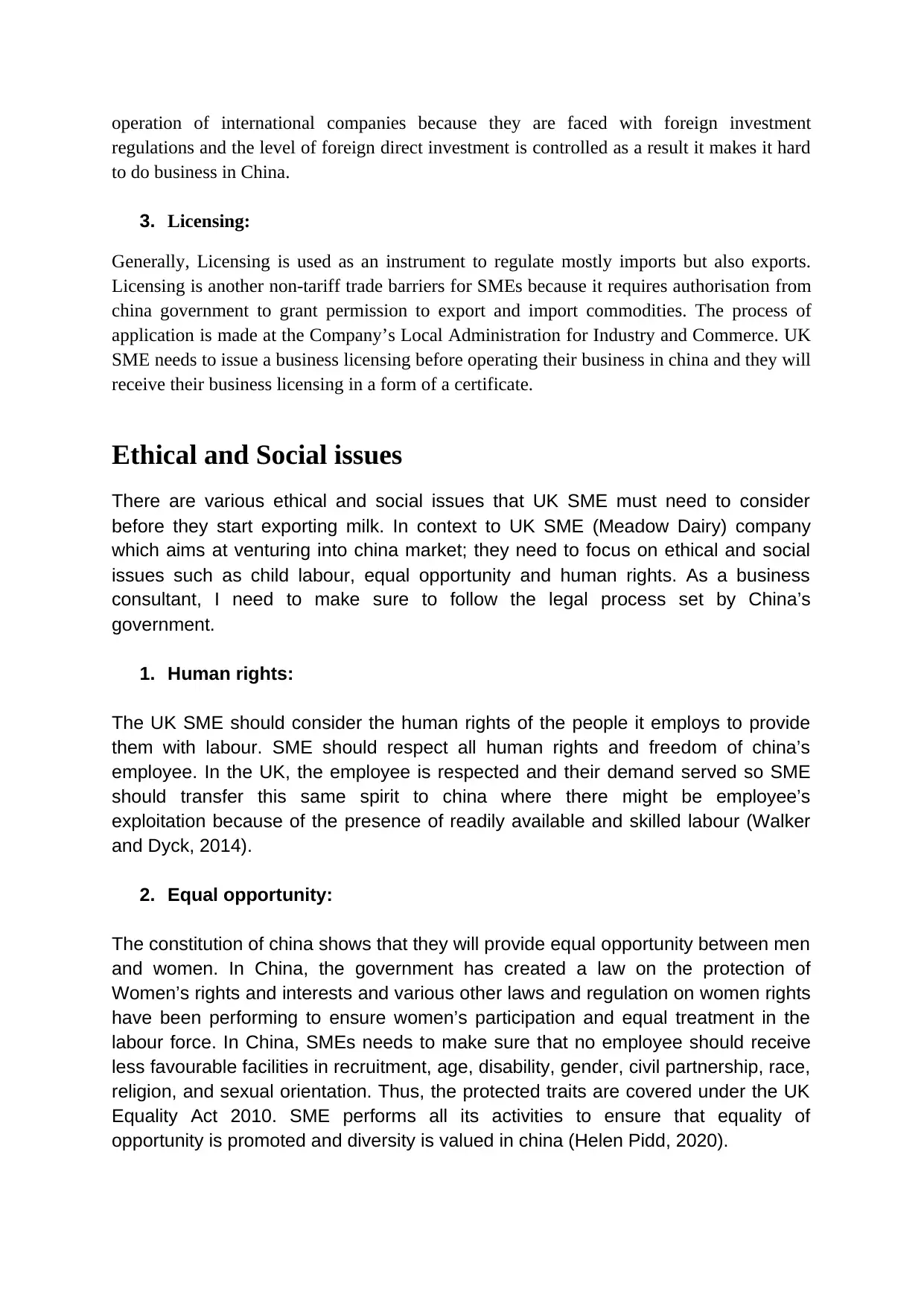
operation of international companies because they are faced with foreign investment
regulations and the level of foreign direct investment is controlled as a result it makes it hard
to do business in China.
3. Licensing:
Generally, Licensing is used as an instrument to regulate mostly imports but also exports.
Licensing is another non-tariff trade barriers for SMEs because it requires authorisation from
china government to grant permission to export and import commodities. The process of
application is made at the Company’s Local Administration for Industry and Commerce. UK
SME needs to issue a business licensing before operating their business in china and they will
receive their business licensing in a form of a certificate.
Ethical and Social issues
There are various ethical and social issues that UK SME must need to consider
before they start exporting milk. In context to UK SME (Meadow Dairy) company
which aims at venturing into china market; they need to focus on ethical and social
issues such as child labour, equal opportunity and human rights. As a business
consultant, I need to make sure to follow the legal process set by China’s
government.
1. Human rights:
The UK SME should consider the human rights of the people it employs to provide
them with labour. SME should respect all human rights and freedom of china’s
employee. In the UK, the employee is respected and their demand served so SME
should transfer this same spirit to china where there might be employee’s
exploitation because of the presence of readily available and skilled labour (Walker
and Dyck, 2014).
2. Equal opportunity:
The constitution of china shows that they will provide equal opportunity between men
and women. In China, the government has created a law on the protection of
Women’s rights and interests and various other laws and regulation on women rights
have been performing to ensure women’s participation and equal treatment in the
labour force. In China, SMEs needs to make sure that no employee should receive
less favourable facilities in recruitment, age, disability, gender, civil partnership, race,
religion, and sexual orientation. Thus, the protected traits are covered under the UK
Equality Act 2010. SME performs all its activities to ensure that equality of
opportunity is promoted and diversity is valued in china (Helen Pidd, 2020).
regulations and the level of foreign direct investment is controlled as a result it makes it hard
to do business in China.
3. Licensing:
Generally, Licensing is used as an instrument to regulate mostly imports but also exports.
Licensing is another non-tariff trade barriers for SMEs because it requires authorisation from
china government to grant permission to export and import commodities. The process of
application is made at the Company’s Local Administration for Industry and Commerce. UK
SME needs to issue a business licensing before operating their business in china and they will
receive their business licensing in a form of a certificate.
Ethical and Social issues
There are various ethical and social issues that UK SME must need to consider
before they start exporting milk. In context to UK SME (Meadow Dairy) company
which aims at venturing into china market; they need to focus on ethical and social
issues such as child labour, equal opportunity and human rights. As a business
consultant, I need to make sure to follow the legal process set by China’s
government.
1. Human rights:
The UK SME should consider the human rights of the people it employs to provide
them with labour. SME should respect all human rights and freedom of china’s
employee. In the UK, the employee is respected and their demand served so SME
should transfer this same spirit to china where there might be employee’s
exploitation because of the presence of readily available and skilled labour (Walker
and Dyck, 2014).
2. Equal opportunity:
The constitution of china shows that they will provide equal opportunity between men
and women. In China, the government has created a law on the protection of
Women’s rights and interests and various other laws and regulation on women rights
have been performing to ensure women’s participation and equal treatment in the
labour force. In China, SMEs needs to make sure that no employee should receive
less favourable facilities in recruitment, age, disability, gender, civil partnership, race,
religion, and sexual orientation. Thus, the protected traits are covered under the UK
Equality Act 2010. SME performs all its activities to ensure that equality of
opportunity is promoted and diversity is valued in china (Helen Pidd, 2020).
⊘ This is a preview!⊘
Do you want full access?
Subscribe today to unlock all pages.

Trusted by 1+ million students worldwide
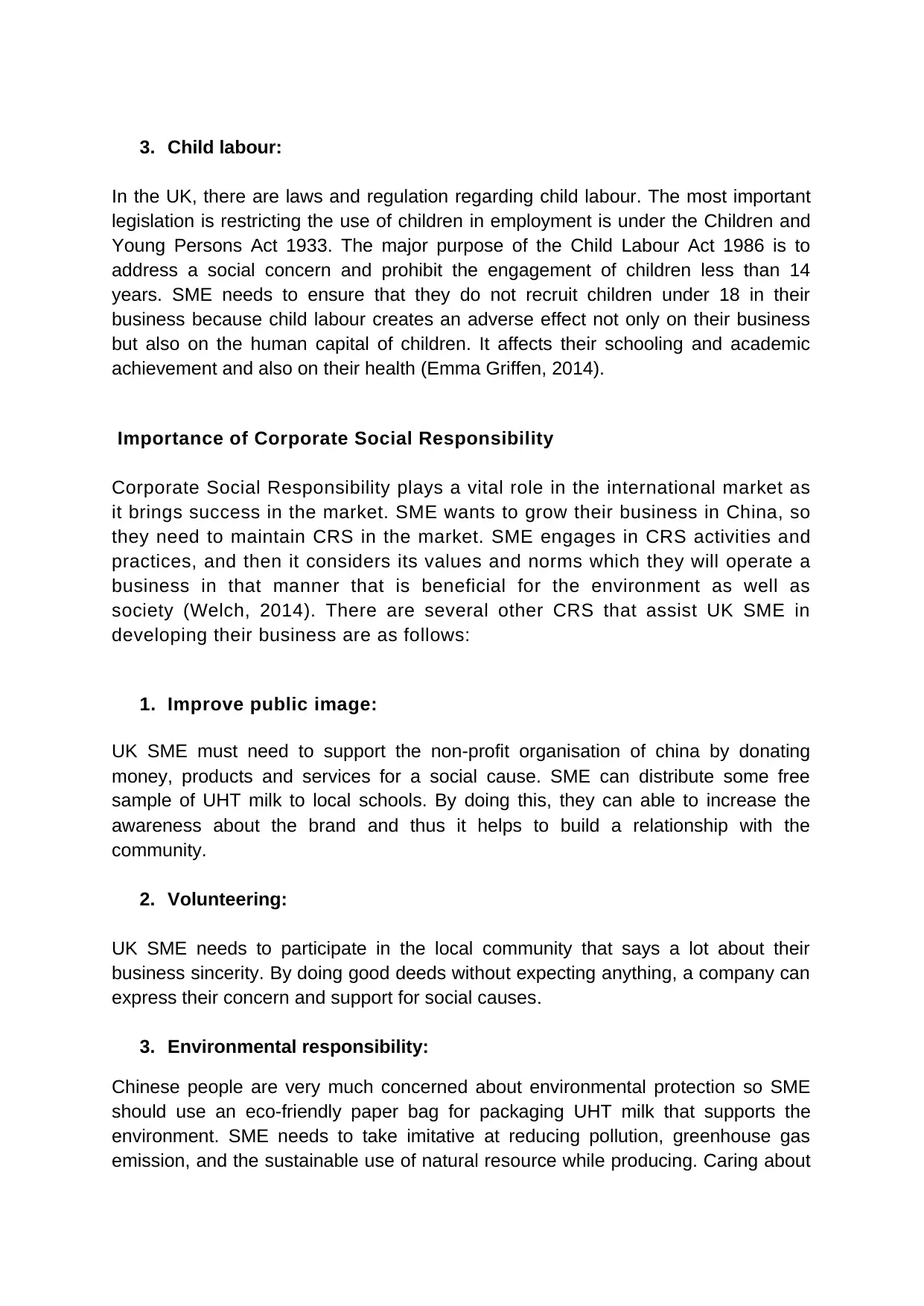
3. Child labour:
In the UK, there are laws and regulation regarding child labour. The most important
legislation is restricting the use of children in employment is under the Children and
Young Persons Act 1933. The major purpose of the Child Labour Act 1986 is to
address a social concern and prohibit the engagement of children less than 14
years. SME needs to ensure that they do not recruit children under 18 in their
business because child labour creates an adverse effect not only on their business
but also on the human capital of children. It affects their schooling and academic
achievement and also on their health (Emma Griffen, 2014).
Importance of Corporate Social Responsibility
Corporate Social Responsibility plays a vital role in the international market as
it brings success in the market. SME wants to grow their business in China, so
they need to maintain CRS in the market. SME engages in CRS activities and
practices, and then it considers its values and norms which they will operate a
business in that manner that is beneficial for the environment as well as
society (Welch, 2014). There are several other CRS that assist UK SME in
developing their business are as follows:
1. Improve public image:
UK SME must need to support the non-profit organisation of china by donating
money, products and services for a social cause. SME can distribute some free
sample of UHT milk to local schools. By doing this, they can able to increase the
awareness about the brand and thus it helps to build a relationship with the
community.
2. Volunteering:
UK SME needs to participate in the local community that says a lot about their
business sincerity. By doing good deeds without expecting anything, a company can
express their concern and support for social causes.
3. Environmental responsibility:
Chinese people are very much concerned about environmental protection so SME
should use an eco-friendly paper bag for packaging UHT milk that supports the
environment. SME needs to take imitative at reducing pollution, greenhouse gas
emission, and the sustainable use of natural resource while producing. Caring about
In the UK, there are laws and regulation regarding child labour. The most important
legislation is restricting the use of children in employment is under the Children and
Young Persons Act 1933. The major purpose of the Child Labour Act 1986 is to
address a social concern and prohibit the engagement of children less than 14
years. SME needs to ensure that they do not recruit children under 18 in their
business because child labour creates an adverse effect not only on their business
but also on the human capital of children. It affects their schooling and academic
achievement and also on their health (Emma Griffen, 2014).
Importance of Corporate Social Responsibility
Corporate Social Responsibility plays a vital role in the international market as
it brings success in the market. SME wants to grow their business in China, so
they need to maintain CRS in the market. SME engages in CRS activities and
practices, and then it considers its values and norms which they will operate a
business in that manner that is beneficial for the environment as well as
society (Welch, 2014). There are several other CRS that assist UK SME in
developing their business are as follows:
1. Improve public image:
UK SME must need to support the non-profit organisation of china by donating
money, products and services for a social cause. SME can distribute some free
sample of UHT milk to local schools. By doing this, they can able to increase the
awareness about the brand and thus it helps to build a relationship with the
community.
2. Volunteering:
UK SME needs to participate in the local community that says a lot about their
business sincerity. By doing good deeds without expecting anything, a company can
express their concern and support for social causes.
3. Environmental responsibility:
Chinese people are very much concerned about environmental protection so SME
should use an eco-friendly paper bag for packaging UHT milk that supports the
environment. SME needs to take imitative at reducing pollution, greenhouse gas
emission, and the sustainable use of natural resource while producing. Caring about
Paraphrase This Document
Need a fresh take? Get an instant paraphrase of this document with our AI Paraphraser
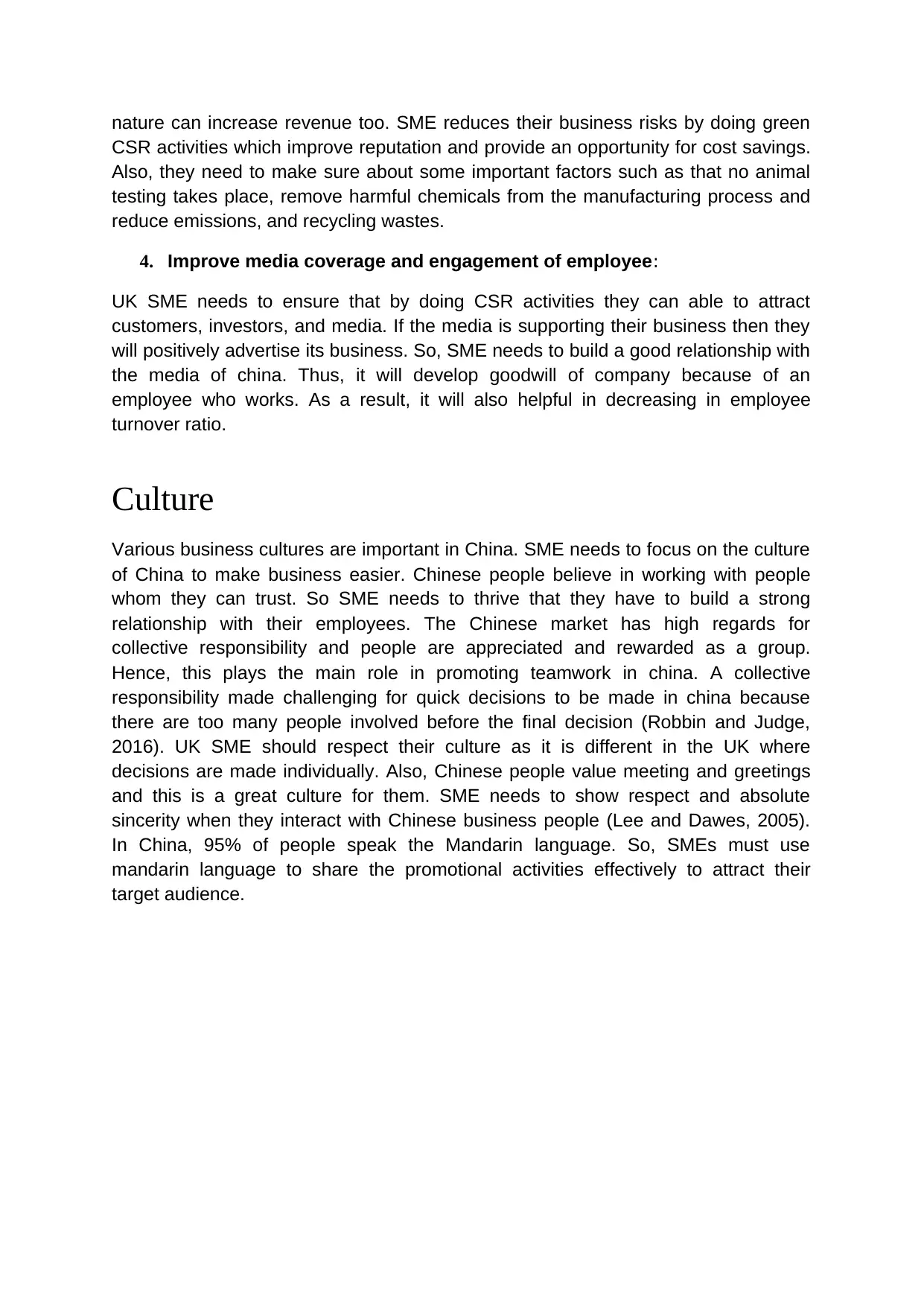
nature can increase revenue too. SME reduces their business risks by doing green
CSR activities which improve reputation and provide an opportunity for cost savings.
Also, they need to make sure about some important factors such as that no animal
testing takes place, remove harmful chemicals from the manufacturing process and
reduce emissions, and recycling wastes.
4. Improve media coverage and engagement of employee:
UK SME needs to ensure that by doing CSR activities they can able to attract
customers, investors, and media. If the media is supporting their business then they
will positively advertise its business. So, SME needs to build a good relationship with
the media of china. Thus, it will develop goodwill of company because of an
employee who works. As a result, it will also helpful in decreasing in employee
turnover ratio.
Culture
Various business cultures are important in China. SME needs to focus on the culture
of China to make business easier. Chinese people believe in working with people
whom they can trust. So SME needs to thrive that they have to build a strong
relationship with their employees. The Chinese market has high regards for
collective responsibility and people are appreciated and rewarded as a group.
Hence, this plays the main role in promoting teamwork in china. A collective
responsibility made challenging for quick decisions to be made in china because
there are too many people involved before the final decision (Robbin and Judge,
2016). UK SME should respect their culture as it is different in the UK where
decisions are made individually. Also, Chinese people value meeting and greetings
and this is a great culture for them. SME needs to show respect and absolute
sincerity when they interact with Chinese business people (Lee and Dawes, 2005).
In China, 95% of people speak the Mandarin language. So, SMEs must use
mandarin language to share the promotional activities effectively to attract their
target audience.
CSR activities which improve reputation and provide an opportunity for cost savings.
Also, they need to make sure about some important factors such as that no animal
testing takes place, remove harmful chemicals from the manufacturing process and
reduce emissions, and recycling wastes.
4. Improve media coverage and engagement of employee:
UK SME needs to ensure that by doing CSR activities they can able to attract
customers, investors, and media. If the media is supporting their business then they
will positively advertise its business. So, SME needs to build a good relationship with
the media of china. Thus, it will develop goodwill of company because of an
employee who works. As a result, it will also helpful in decreasing in employee
turnover ratio.
Culture
Various business cultures are important in China. SME needs to focus on the culture
of China to make business easier. Chinese people believe in working with people
whom they can trust. So SME needs to thrive that they have to build a strong
relationship with their employees. The Chinese market has high regards for
collective responsibility and people are appreciated and rewarded as a group.
Hence, this plays the main role in promoting teamwork in china. A collective
responsibility made challenging for quick decisions to be made in china because
there are too many people involved before the final decision (Robbin and Judge,
2016). UK SME should respect their culture as it is different in the UK where
decisions are made individually. Also, Chinese people value meeting and greetings
and this is a great culture for them. SME needs to show respect and absolute
sincerity when they interact with Chinese business people (Lee and Dawes, 2005).
In China, 95% of people speak the Mandarin language. So, SMEs must use
mandarin language to share the promotional activities effectively to attract their
target audience.
1 out of 5
Related Documents
Your All-in-One AI-Powered Toolkit for Academic Success.
+13062052269
info@desklib.com
Available 24*7 on WhatsApp / Email
![[object Object]](/_next/static/media/star-bottom.7253800d.svg)
Unlock your academic potential
Copyright © 2020–2026 A2Z Services. All Rights Reserved. Developed and managed by ZUCOL.





